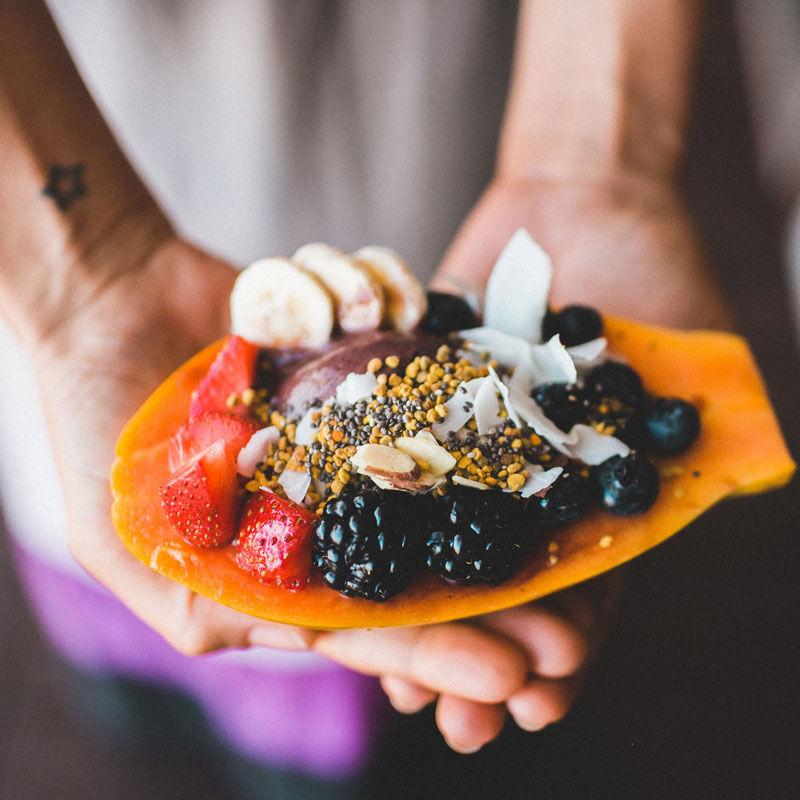By Annie Bothma, November 2022
Over the past few weeks I have discussed some key things athletes need to take in consideration if they are currently following a plant-based diet or thinking about adopting this dietary pattern to make sure they are still able to stay healthy and perform at their best. This last blog post in the plant-based athlete series will focus on summarizing the key concepts and considerations to remember to help you thrive as a plant-based athlete.

KEY NUTRITIONAL CONSIDERATIONS FOR PLANT-BASED ATHLETES
In general, vegan diets tend to be lower in Calories, protein, fat, vitamin B12, omega-3 fats, calcium and iodine than omnivorous diets, whilst concurrently being higher in carbohydrates, fibre, micronutrients, phytochemicals and antioxidants.
Achieving a high energy intake is difficult in some instances, owing to plant-based foods promoting satiety. Issues with the digestibility and absorption of nutrients such as protein, calcium, iron and zinc might be problematic as well. This may mean athletes might need to consume higher amounts of these foods compared to omnivores and other vegetarians.
1. MAKE SURE YOU MEET YOUR ENERGY REQUIREMENTS

Managing energy balance is important for all athletes, but this issue is likely to be amplified even further when a habitual diet promotes early satiation and reduced appetite, which may occur on a plant-based diet. Plant foods typically have a higher nutrient-density, since they contain a higher level of vitamins, minerals, fibre, but may not provide you enough calories to fuel your training.
Being in a low energy-availability can result in a host of adverse health and performance consequences that may lead to very serious problems in the long-term like Relative Energy Deficiency in Sport (RED-s). Additionally, high intensity training can reduce appetite, and hectic travel schedules, poor food availability while traveling, as well as gastrointestinal discomfort might mean that some athletes find it difficult to meet their energy requirements.
With insufficient energy intake, immunity might also become compromised, leading to illnesses and time off from training and competition. Weight loss can lead to the loss of muscle mass, reduced strength, lower work capacity and a lack of satisfactory training adaptation. As an athlete you need to make sure you maintain an appropriate energy balance which is important if you want to stay healthy and perform at your best.
SOME TIPS FOR MEETING YOUR ENERGY REQUIREMENTS ON A PLANT-BASED DIET
Add more energy dense foods such as nuts, seeds and oils to meals and snacks.
Swap the greens in your salads for grains like rice, quinoa, buckwheat or pasta.
Choose starchy vegetables like sweet potato or potato instead of low-calorie vegetables like celery and cucumber.
Avoid consuming too much fiber in your meals, since it will increase satiety and may reduce absorption of essential minerals like iron, magnesium and zinc.
Eat frequent snacks between main meals composed of carbohydrates, protein and healthy fats.
Fuel your workouts and long training sessions with energy dense foods like dates or other dried fruit, bananas, nuts or nut butter, breads, pasta, rice, and sports products like bars, gels and drinks.
Pack a lot of nutrients and energy into a blender by making a smoothie with bananas, soy milk, dates, nut butter and your favorite plant-based protein powder.
2. YOU MAY FIND IT EASIER TO MEET YOUR CARBOHYDRATE NEEDS ON A PLANT-BASED DIET

Vegan diets tend to be higher in carbohydrates, fibre, fruits, vegetables, antioxidants and phytochemical compared to most omnivorous diets.
For this reason, it has been suggested that some endurance athletes might intentionally adopt a vegan diet in order to meet their carbohydrate needs, or to assist weight management goals. Achieving an adequate carbohydrate intake through a vegan diet is relatively straightforward, and grains, legumes, beans, tubers, root vegetables and fruits can all be consumed to meet daily carbohydrate requirements.
To consume enough carbohydrates, athletes doing high volumes of training, should rather choose high-carbohydrate sources that are lower in fibre to make sure they still meet their energy requirements and can perform well during training and competitions. However, don't exclude all whole-grains from your diet, since athletes still require some fibre in their diet and excluding all whole-grains can lead to deficiencies from B-vitamins or other macronutrients.
Both whole-grains and low-fibre carbohydrates have their place in an athlete's diet. Pick low-fibre options before training and rather save the whole grains for when the hard work is done!
3. PLANT-BASED ATHLETES NEED TO PRIORITIZE THEIR PROTEIN INTAKE

Regardless if you are following a plant-based diet or not, protein quality and quantity matters for all athletes who are striving to maximize speed-up their recovery, maximize their training adaptations and improve their performance.
Getting enough protein on a plant-based diet can be done, but it certainly requires a lot more planning and preparation to make sure you are getting an adequate amount of essential amino acids in your diet. Combine plant-based protein sources whenever possible to ensure the full spectrum of amino acids are present in your meals. Consume 20-40 gram protein doses at meals and snacks throughout the day and include a pre-bedtime protein-rich snack. Consider supplementing with a plant-based protein if you are struggling to meet your total daily protein requirements.
TIPS TO GET MORE ESSENTIAL AMINO-ACIDS ON A PLANT BASED DIET
1. COMBINE PROTEINS SOURCES
Try combining soy and pea proteins (low in methionine/high in lysine) with corn, hemp and brown rice proteins (high in methionine/low in lysine) to ensure a full complement of essential amino acids is present to fully stimulate MPS.
2. INCREASE YOUR QUANTITY
Consume a higher quantity of plant-based proteins per meal and at snacks (compared to animal-based proteins) to compensate for reduced digestibility and low biological value.
3. EAT MORE FREQUENTLY
Consume 20-40 gram protein doses at meals and snacks throughout the day is a practical way to ensure a full spectrum of essential amino acids is available within circulation to support MPS. This should include pre-sleep feeding in the evening, as recovery and muscle protein synthesis continues through the night.
4. INCLUDE A PRE-BEDTIME PROTEIN-RICH SNACK
Pre-sleep protein is an opportunity to meet daily protein recommendations and enhance recovery by supporting overnight muscle protein synthesis. Strive for a 25-40 g dose of protein high in essential amino acids and leucine.
5. CONSIDER ADDING A SUPPLEMENT
Supplementing with a mixed blend or isolated form like soy or pea, vegan-based protein powder that contains sufficient leucine (40g of vegan protein = 30g protein, 2.85g of leucine).
6. RECOMMENDED DIALY TOTAL PROTEIN-INTAKE FOR PLANT-BASED ATHLETES
Aim for 1.4 to 2.0 g of protein per/kg of body-weight per day of total protein.
4. IT IS HARDER TO GET ENOUGH OMEGA-3 FATTY ACIDS FROM ON A PLANT-BASED DIET

Due to an absence of marine-sourced fats, vegans appear to consume fewer omega-3 fatty acids and possess lower serum omega-3 fatty acid levels than omnivores and other vegetarians. This might have important health and performance implications, since omega-3 fatty acids are important for normal growth and development.
As a vegan or vegetarian athlete, you can make sure you meet your needs by combining plant-based dietary sources of ALA and take a DHA supplement derived from micro-algae oil to optimize your omega-3 intake.
OMEGA 3 FATTY ACIDS (ALA, EPA and DHA)
ALA: Flax seeds, walnuts, chia seeds, hemp seeds, avocado
EPA: Seaweed, algae
DHA: Micro-algae oil, seaweed
5. CERTAIN MICRONUTRIENTS REQUIREMENTS IS A LOT HARDER TO MEET ON A PLAN-BASED DIET

Achieving micronutrient sufficiency is an important concern for all athletes. However, if you are following a vegan diet you need to pay extra attention to your vitamin B12, iron, zinc, calcium, iodine and vitamin D intake. Deficiency in these key micronutrients could have detrimental health and performance implications for plant-based athletes.
Below is a list of the common micronutrient deficiencies on a plant-based diet and which food sources can help you meet the daily recommended intake.
VEGAN-FRIENDLY FOOD SOURCES
Vitamin B12: Supplements, fortified foods, plant-milks, nutritional yeast (fortified), fermented soy, mushrooms
Iron: Legumes, grains, nuts, seeds, fortified foods, green vegetables
Zinc: Beans, nuts, seeds, oats, wheat germ, nutritional yeast
Calcium: Tofu (calcium set), fortified plant milks and juice, kale, broccoli, sprouts, cauliflower, bok choy.
Iodine: Seaweed, cranberries, potatoes, prunes, navy beans, iodized salt.
Vitamin D: Lichen-derived D3 supplements.

Each post in this series will include a recipe from Leozette Roode's new cook book: THE SOUTH AFRICAN VEGAN COOKBOOK to inspire you to bring more color into your plate.
FEATURED RECIPE: BLISSFUL BERRY BALLS
By Leozette Roode
Serves: 16 balls
Cooking Time: Under 30-minutes

INGREDIENTS:
1 cup almonds
1 cup desiccated coconut (use 1/2 for rolling in the end)
2 tablespoons dried cranberries
2 tablespoons dried cranberries
1 cup dates, pitted & soaked in hot water
3 tablespoons water (from soaked dates)
INSTRUCTIONS:
Place the almond flour and desiccated coconut in a food producer and pulse until mixed.
Add the cranberries and goji berries and process until the berries are broken into little pieces (this might take a little bit longer than expected). Add the chewy, soaked dates and 3 tablespoons of date water to the bowl of the processor and mix until a gooey dough forms. Scape down the sides with a silicone spatula from time to time.
Wet your finger and roll the dollops of dough into balls (the size of a R5 coin). Roll the balls into the leftover desiccated coconut and place in the fridge in an airtight container.
WHY I LIKE THIS RECIPE
I have always been a big fan of date balls as a snack option for all athletes. It is quick and easy to make, proratable and you can make so many different delicious flavors or variations. I even made date balls while living at 3000 m above seal-level in a training camp in a small rural township, called Kipsiat, in Kenya. Dates are high in carbohydrates and provides a quick energy source for athletes on the go. Certain athletes even prefer using them in endurance competitions over engineered sport products like gels and carbohydrate blocks.

KEY TAKE-AWAY
Through the strategic selection and management of food choices, and with special attention being paid to the achievement of energy, macro and micronutrient recommendations, along with appropriate supplementation, a vegan diet can achieve the nutrition needs of most athletes.
Following a plant-based diet may require a bit more planning and preparation. It may have a some health risks, if done incorrectly, but that is the case with all diets, and it may have a lot of health benefits if it is well thought out. Make sure you get enough Calories, are meeting your macronutrient requirements and avoiding micronutrient deficiencies so you can thrive as a plant-based athlete!
RESOURCES:
Vegan diets: practical advice for athletes and exercisers, (2017), By David Rogerson
Sport Nutrition, Third Edition. (2019) by Asker Jeukendrup, Micheal Gleeson

Comments